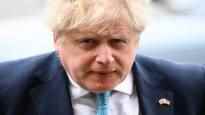We asked Europe researcher Timo Miettise what Britain’s near-future politics looks like. The researcher also tells what might have decided Boris Johnson’s decision to resign now.
15:33•Updated 16:18
British Prime Minister Boris Johnson resigns from the leadership of the Conservative Party and the position of Prime Minister, says, among other things, the British Broadcasting Corporation BBC. (you switch to another service)The background is the collapse of trust: numerous representatives of the administration and ministers resigned from their positions because of the situation.
However, Johnson plans to continue as prime minister until a successor is chosen. The new prime minister would be appointed in the fall at the latest.
We asked an academy researcher at the University of Helsinki From Timo Miettiwhat effect the situation has on the near future of British politics and Johnson’s career after the government crisis.
1. Why did Boris Johnson decide to resign?
According to the researcher, the key reason is the resignation of ministers.
The main reasons are the large-scale resignation of ministers and the fact that Johnson was not able to assemble a functioning government from the remaining representatives, says Miettinen, who is also known in the public as a European researcher.
The underlying reasons are, on the other hand, Johnson’s personal quarrels, the division of the Conservative Party and Britain’s exit from the EU, Brexit.
2. When will the new prime minister take office?
Johnson is scheduled to retire as prime minister in the fall at the latest. In addition to this, there may be new elections ahead.
According to current information, Johnson would step down from the position in the fall at the latest. Miettinen estimates that the parliament’s summer vacation break and the fact that the conservative party is playing for time to assemble its own ranks are factors in the background.
Most likely, the next Prime Minister will be from the Conservative Party.
The bigger question is how long the new Prime Minister of the Conservative Party could rule without another election.
Britain’s political culture includes the requirement that the new prime minister test his own support also in the elections. Miettinen estimates that it is very difficult for the prime minister to rule without the mandate won in the elections.
In new elections, it would not be at all certain that the next prime minister would come from the conservative party.
3. Who are the possible strong candidates for the new prime minister at this stage?
A few of the conservative party’s most neutral politicians have already emerged in the initial speculations.
According to Miettinen, for example, the former Minister of State Finance Rishi SunakMinister of Defense Ben Wallace and Foreign Minister Liz Truss have managed to remain relatively neutral in the party’s internal factions. They have come to the fore in the speculations of the first phase of the next prime minister.
4. What does this government crisis say about British politics from a researcher’s point of view?
The Conservative Party has split from within into two groups, which even Boris Johnson’s predecessors have not managed to unite.
The deep divisions on the conservative side have also plagued Johnson’s predecessors.
– They have not been able to bridge the divide between the hard nationalist Brexit group and the more pro-European and pro-business and partly more socially liberal group.
According to Miettinen, the internal division of the Conservative Party explains why many of Britain’s previous governments have been so short-lived.
The promises made during Brexit have not been fulfilled.
Miettinen says that the restrictions on the import and export of goods brought by Brexit are not at least easing the situation in the midst of accelerating inflation in Britain.
5. How easy is it for Boris Johnson to possibly continue as Prime Minister for a few more months?
In the short transition period after the decision to resign, it is mostly about a civil servant government.
Johnson’s position in the coming months is compared to an acting prime minister who no longer has any major initiatives to push through. According to Miettinen, it is largely about civil service government.
6. What is Johnson’s future in the field of politics?
The researcher does not believe that Boris Johnson will remain a regular politician.
According to Miettinen, it is difficult to see that Johnson would be satisfied with the position of a rank-and-file member of parliament. British national politics has never been a particular passion for Johnson. Miettinen believes that Johnson will go in search of future plans in another direction.
7. What effect does all this have on NATO applications or Europe?
A changing prime minister has no effect on NATO applications, but the relationship between Britain and the EU may take shape with the new leader.
According to Miettinen, Johnson’s resignation will not have a huge impact on the NATO applications of Finland and Sweden, because Britain has already ratified the NATO applications under the leadership of the government.
The biggest impact is likely to be how quickly a possible new election is held.
The Conservative Party and the Labor Party have different views on the relationship between Britain and the EU. The Labor Party is clearly pushing for a closer relationship with Europe, while the Conservative Party is sticking to a so-called hard Brexit, in which Britain’s room for maneuver outside the EU is as large as possible.
